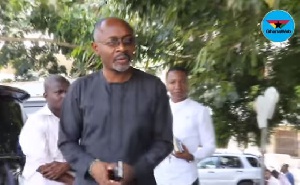General News of Thursday, 1 February 2018
Source: dailyguideafrica.com
Woyome hot over Supreme Court order
The Supreme Court has in a unanimous decision ordered embattled businessman, Alfred Agbesi Woyome, to submit himself to be orally examined by the state in relation to the GH¢51.2 million he received as judgement debt.
The court’s order follows a ruling on a review application filed by lawyer for Woyome, the National Democratic Congress (NDC) financier, Osafo Buaben, seeking to reverse an order by a sole judge, Justice A.A. Benin, which paved way for the judgment debtor to be orally examined, and his assets valued.
The application was also challenging the judge’s order to invite officials of the Lands Commission to evaluate Mr. Woyome’s properties in a garnishee proceeding – a decision the lawyer averred was an affront to Mr. Woyome’s right to privacy.
Ruling
The Supreme Court, presided over by a three-member review panel chaired by Justice William Atuguba – with Sophia Adinyira and Jones Dotse assisting – in a unanimous decision, dismissed the application, labelling it a “red herring” used by Woyome and his lawyer as a “further illustration of his delay mechanism.”
According to the court, the Order 46 Roll 1 and 2 which the single judge relied on to grant the oral examination, is to enable a judgment creditor who is frustrated and encounters difficulties in the execution of judgment to take advantage of this procedure, and orally examine the debtor to find out why the judgment debtor is unable to satisfy that judgment or order.
It said, it is quite certain that that was the procedure that the state applied and the single judge also used when he granted the application for the oral examination of Mr. Woyome.
“We have critically examined the issues and or questions set out by the single judge and are convinced that the Rule indeed has fortified and protected the single judge in the orders he made,” the apex court maintained.
The court therefore dismissed the application in its entirety and ordered Mr. Woyome to submit himself for the oral examination to continue.
Delay Tactics
Mr Agbesi Woyome and his lawyers had on many occasions filed numerous applications seeking to halt the oral examination, the evaluation of his assets and a possible seizure of those properties to offset the debt he owes the state.
The Supreme Court recently dismissed an application asking the court to halt all attempts to retrieve the money until a determination of another related case being heard at the African Court on Human and People’s Rights in Arusha, Tanzania, had been determined.
Woyome and his lawyer had argued that until the African Court gives its ruling, the decision of the Supreme Court will invariably affect the decision of the African Court.
His lawyer, Osafo Buabeng, quoting Order 46 Roll 1, argued that for the purposes of execution, a judgment debtor could only be orally examined but does not allow the sale of the judgment debtor’s properties.
The application was also challenging the nature of questions that the businessman could be asked, which according to lawyer Buaben, does not include questions regarding how he spent the money.
He said the Order states that it is only the debtor who could be orally examined, but the single judge’s decision to invite officials of the Land Commission to testify in the matter risks turning the whole process into a full blown trial.
Mr. Buabeng stated that he was yet to come across a garnishee proceeding where the immovable properties of the judgment debtor are to be sold.
He thus, prayed the court to set aside Justice Benin’s orders which allowed for evaluation and rather focus on the oral examination.
Opposition
Deputy Attorney General Godfred Yeboah Dame vehemently opposed the application citing Order 46 Roll 2 which provides alternative means of retrieving judgment debts.
He said Roll 2 provides an exception to Roll 1, and the judge’s order was informed by the difficulties the state was facing in retrieving the money from Mr. Woyome.
He said the Order also provides a window for whether the judgment debtor has any properties or any other means for satisfying the judgment debt.
On the invitation of the officials of the Lands Commission to evaluate Mr. Woyome’s properties, the Deputy AG argued that the decision was informed by Mr. Woyome’s responses during the oral examination regarding his stake in certain properties.
He said the purpose of the oral examination was to ensure that all properties or all means available for the satisfaction of the judgement debt are identified.
Mr. Dame therefore maintained that Woyome must answer all pertinent questions relating to attempts at retrieving the money.
He labelled the application as “totally unfounded.”
The apex court will in the course of next week fix a date for Mr. Woyome to enter the dock to resume the oral examination by state attorneys.











